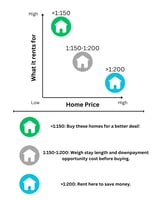Buying a home is one of those big decisions you only make a few times—so don’t let an agent’s...
How to Decide If You Can Trust Someone in a Negotiation or When Choosing a Realtor
Trust is the cornerstone of any successful negotiation or real estate transaction. Whether you’re sitting across the table in a high-stakes deal or interviewing a realtor to guide you through one of the biggest purchases of your life, figuring out who you can rely on is critical. The challenge? Trust isn’t something you can verify with a quick glance at a resume or a flashy business card. It’s built through actions, words, and sometimes, the courage to admit limitations. One surprisingly effective way to gauge trustworthiness (whether in a negotiation or when selecting a realtor) is to see how quickly someone says, “I don’t know,” and follows it with, “but I’ll find out.” Let’s explore why this matters and how you can spot trust in these high-pressure situations, drawing on insights from business thought leaders.
When interviewing realtors, trust often tops the list of concerns. You’re not just hiring someone to find a house; you’re entrusting them with your financial future, your family’s needs, and your peace of mind. A realtor who pretends to know everything can be a red flag. Nobody has all the answers. Real estate markets are complex, with local nuances, financing quirks, and unexpected hurdles. A trustworthy realtor doesn’t bluff their way through uncertainty. Instead, they’re quick to admit when they’re stumped and commit to getting the right information. This honesty signals integrity and a focus on your best interests over their ego. It’s a small but powerful moment that lays the foundation for a relationship where you can rely on their expertise and experience.
This principle applies equally to negotiations. Whether you’re hammering out a business deal or settling terms with a seller, trust hinges on transparency. A negotiator who admits they don’t have all the facts but promises to follow up demonstrates respect for the process and for you. It shows they’re not here to win at all costs, they’re aiming for a fair outcome. As Stephen M.R. Covey writes in The Speed of Trust, “Trust is a pragmatic, tangible, actionable asset that you can create.” When someone owns their limits, they’re actively building that asset, proving they value truth over appearances.
Consider a story from The Book on Negotiating Real Estate by J Scott and Mark Ferguson. The authors recount a negotiation where a buyer’s agent gained the seller’s trust by admitting they didn’t know the exact cost of a proposed repair but offered to get a contractor’s estimate within 24 hours. This small act of candor shifted the dynamic, fostering collaboration and leading to a smoother deal. The lesson? Honesty about limitations can turn skepticism into partnership.
So, how do you test for this kind of trustworthiness? When interviewing a realtor, ask specific, challenging questions about the local market, financing options, or potential deal-breakers like zoning laws. If they dodge or invent answers, take note. A trustworthy realtor will pause, admit when they’re unsure, and outline how they’ll get the information you need. In negotiations, pay attention to how your counterpart handles tough questions. Do they deflect with vague promises, or do they acknowledge gaps and commit to clarity? As Warren Buffett famously said, “It takes 20 years to build a reputation and five minutes to ruin it.” A quick “I don’t know” followed by action protects that reputation and builds trust.
Another tactic is to observe their listening skills. Trustworthy people prioritize understanding over impressing. In The 10 Laws of Trust, Joel Peterson emphasizes, “To earn trust, money and power aren’t enough; you have to show some concern for others.” A realtor or negotiator who asks thoughtful questions and listens to your needs: rather than pushing their own agenda, shows they’re invested in your success. This aligns with the “I don’t know” test: both reflect a willingness to put your interests first.
Finally, look for consistency. Trust isn’t built in a single moment but through repeated actions. A realtor who follows through on their promise to find an answer or a negotiator who delivers on commitments proves their reliability. As Zig Ziglar put it, “If people like you, they will listen to you. But if people trust you, they will do business with you.”
In the end, trusting someone in a negotiation or when choosing a realtor comes down to their willingness to be human. The fastest way to spot this? Watch how they handle the unknown. A quick, honest “I don’t know, but I’ll find out” is more than an admission—it’s a commitment to transparency, accountability, and your shared success. Next time you’re in a high-stakes conversation, lean into those moments of uncertainty. They might just reveal the person you can truly rely on.



